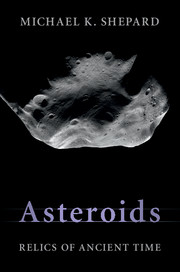Book contents
- Frontmatter
- Dedication
- Contents
- Preface
- Acknowledgements
- Brief list of asteroid and meteorite terms
- 1 It's a small world
- 2 A night at the zoo
- 3 It came from outer space
- 4 A day at the museum
- 5 The gambler's fallacy
- 6 Remembrance of things past
- 7 The ties that bind
- 8 Terra incognita
- 9 To your scattered bodies go
- 10 Scouts, sappers, and miners
- Glossary
- Bibliography
- Index
Preface
Published online by Cambridge University Press: 05 May 2015
- Frontmatter
- Dedication
- Contents
- Preface
- Acknowledgements
- Brief list of asteroid and meteorite terms
- 1 It's a small world
- 2 A night at the zoo
- 3 It came from outer space
- 4 A day at the museum
- 5 The gambler's fallacy
- 6 Remembrance of things past
- 7 The ties that bind
- 8 Terra incognita
- 9 To your scattered bodies go
- 10 Scouts, sappers, and miners
- Glossary
- Bibliography
- Index
Summary
20392.
That was all that was written on the note in my university mailbox.
“Did you take this message?” I asked the department secretary.
“Yes. A gentleman on the phone told me to leave that note for you. He didn't leave a name, but said you'd know what it meant.”
At first, I was baffled. A phone number? If so, five digits were missing. Area code 203 – I had to look it up – was southwestern Connecticut. I didn't think I knew anyone there.
It had already been a long day, and I was tired and didn't feel like a puzzle just then. But as I went back to my office, a thought struck me. I sat down and opened a web page to the Jet Propulsion Laboratory's Small-Body Database Browser. This is a database of all known asteroids, containing their number, name, and known physical properties. Because there are so many known asteroids, and some have names similar to or identical with other objects in the solar system, asteroids get both a number and a name. For example, Jupiter has a moon called Europa, but there is also an asteroid 52 Europa. Prometheus is a moon of Saturn, but 1809 Prometheus is an asteroid.
In the database I typed in 20392 and hit “Enter.” It popped up immediately – 20392 Mikeshepard; an asteroid had been named for me. For planetary scientists, and especially for those who study asteroids, this is a common honor. But it's an honor nonetheless – a taste of immortality sanctioned by the International Astronomical Union, the governing body of professional astronomers everywhere with the responsibility, among other things, of assigning names to asteroids, comets, and geological features on the planets and their moons.
This was the culmination of years of work I had begun in 1999. In that year, I took a chance and completely changed my research focus from Mars and Venus to asteroids. The anonymous message was left by my mentor, Steve Ostro, a planetary astronomer at the Jet Propulsion Laboratory who almost single-handedly developed the field of asteroid radar studies.
- Type
- Chapter
- Information
- AsteroidsRelics of Ancient Time, pp. xiii - xivPublisher: Cambridge University PressPrint publication year: 2015



